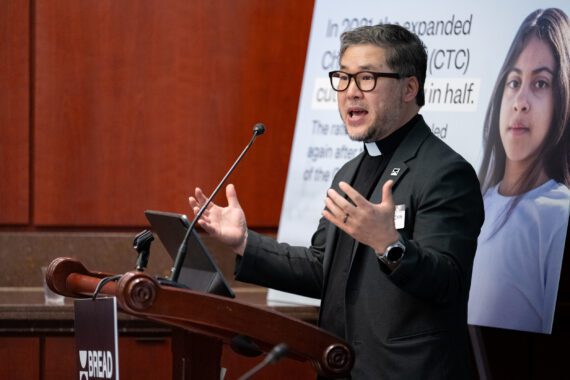By Bishop José García
U.S. Rep. Roger Marshall (R-Kan.) recently referenced the words of Jesus (Mark 14:7) to justify a repeal of the Affordable Care Act.
“Just like Jesus said, ‘The poor will always be with us,’” Marshall said. “There is a group of people that just don’t want health care and aren’t going to take care of themselves.”
Marshall has taken Jesus’ words out of context. This sentiment is contrary to the teachings of Jesus that we should love our neighbor as ourselves. Jesus had uttered them in response to disciples who criticized a poor woman who had chosen to honor Jesus by anointing Him for his burial. She did so with one of her most precious possessions, an ointment of nard.
Jesus was praising the woman for her love and sacrifice. He was not saying that we have no responsibility for low-income community members. In fact, this scripture affirms that those living in poverty can still honor and serve God.
The words of the Bible should not be taken out of context as a pretext for government officials to rationalize policies that hurt people. In our nation—the richest, most technologically advanced in the world—more than 42 million Americans struggle to put food on their table, and 43 million live below the poverty line. One in six children is not sure where their next meal will come from.
According to Proverbs 14:31, “Those who oppress the poor insult their Maker, but those who are kind to the needy honor him.” Deuteronomy 15:11 tell us this: “Since there will never cease to be some in need on the earth, I therefore command you, ‘Open your hand to the poor and needy neighbor in your land.’”
Hunger is a health issue, it leads to poor health, and poor health exacerbates the effects of hunger. Until a reasonable replacement is passed, repealing the Affordable Care Act will plunge low-income Americans deeper into poverty. It does not honor God to quote Jesus to support the idea that “a group of people just don’t want health care and aren’t going to take care of themselves.”
As a nation that proclaims a Christian heritage as a main spiritual component, we are compelled by God’s love to care for “the least of these” and enact policies that help those who struggle with hunger and poverty—and address the circumstances that lead to poverty.
“For, whoever is kind to the poor lends to the Lord, and will be repaid in full” (Proverbs 19:17).
Bishop José García is senior advisor for prayer and strategic initiatives at Bread for the World.



